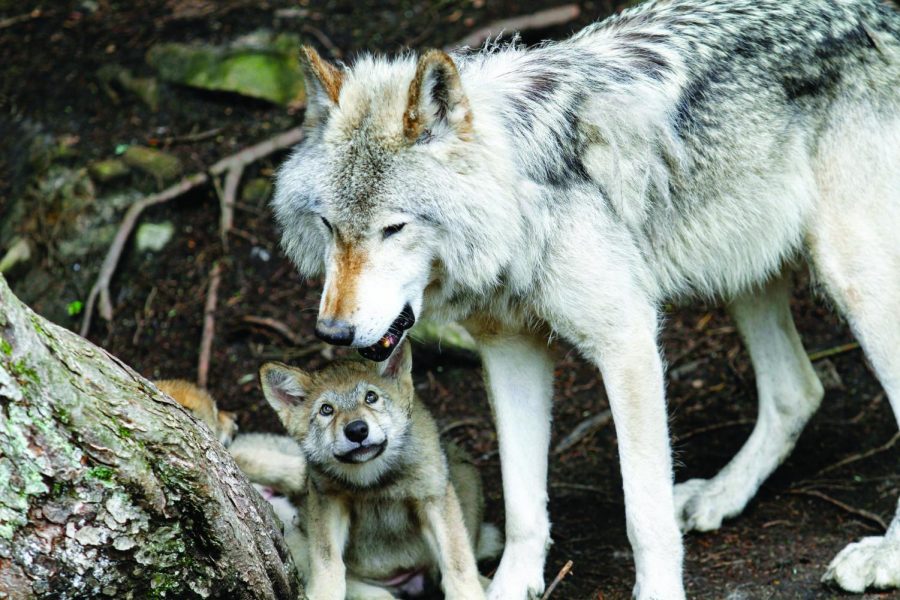Wolf researcher resigns in settlement with WSU
Weiler claims Wielgus can’t speak on issue, who blames political pressure for situation
Research done by Wielgus suggested killing wolves led to more livestock deaths by other predators, angering ranchers and state lawmakers.
May 15, 2018
Robert Wielgus, the wolf researcher in the center of a conflict with the university over his work, has reached a settlement with WSU resulting in his resignation on Monday.
Wielgus will receive $300,000 as a part of the settlement, according to a news release from the Public Employees for Environmental Responsibility, who helped Wielgus in the lawsuit. The payment represents three years of salary and benefits, which Wielgus said he will use to retire early. Neither party acknowledged any wrongdoing in the settlement.
“The whole situation is a shame,” Wielgus said. “WSU lost a world-renown research lab and popular teacher and I lost my job. And that’s due to political interference and WSU’s acquiescence to that political interference.”
He said he was disappointed in the censorship of science at WSU.
“It’s a shame that the science is suppressed and science is silenced at Washington State University,” Wielgus said.
Phil Weiler, vice president of marketing and communications at WSU, said in an email that both the school and Wielgus agreed to limit comment on the matter to the following statement.
“Washington State University and Dr. Rob Wielgus have reached an agreement under which Dr. Wielgus will resign at the end of the spring 2018 semester and release all claims and employment rights in exchange for two payments totaling $300,000, with funds coming from the state. In reaching this agreement, neither party acknowledges any wrongdoing. Both parties view this as an opportunity to sever the employment relationship on mutually acceptable terms, while resolving disputed legal claims,” reads the statement in full.
Weiler also said neither party is allowed to speak about the actions leading up to the settlement.
Wielgus, who served as Director of the Large Carnivore Conservation Laboratory at WSU, faced scrutiny from the university over research he carried out regarding the killing of wolves to protect livestock.
WSU officials were reportedly worried that Wielgus’ findings could have led to retaliation from conservative lawmakers in the form of reduced funding for the Elson S. Floyd College of Medicine.
“If wolves continue to go poorly, there won’t be a new medical school,” WSU lobbyist Dan Coyne said to fellow WSU lobbyist Jim Jesernig in an email.
These emails came after Wielgus published research stating the killing of wolves could actually be more harmful to livestock than if they were left alive.
WSU formally disavowed statements he made to the media in the form of a statement in August 2016, claiming the statements Wielgus made about his research were inaccurate. The university also withdrew funding for his research and performed an investigation into his actions in which Wielgus was cleared of wrongdoing.
PEER said in April of last year that WSU retaliated against Wielgus for his statements to the media in order to please livestock owners and state lawmakers. This came as the university tried to obtain funding and approval for the Floyd College of Medicine.
Wielgus filed an ethics complaint against WSU last April. The complaint alleged 10 violations carried out by WSU President Kirk Schulz, CAHNRS Dean Ron Mittelhammer and CAHNRS Associate Dean Jim Moyer.
Wielgus feels Schulz and his administration gave in to these political pressures after previous WSU President Elson S. Floyd supported him.
“I’ve had the same politician complain about me for over a decade,” Wielgus said, “and president Floyd simply never caved in and acquiesced and the new administration did.”
The politician Wielgus referred to is Rep. Joel Kretz, R-Wauconda, who in 2015, after Wielgus presented research to the state legislature regarding inconsistencies in the report of a wolf killing by the Washington Department of Fish and Wildlife. Even though his research was ordered by Gov. Jay Inslee, Kretz told Floyd that he wanted Wielgus’ lab and research shut down.




















